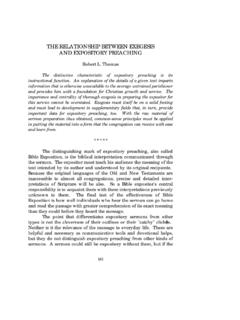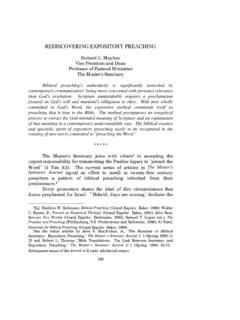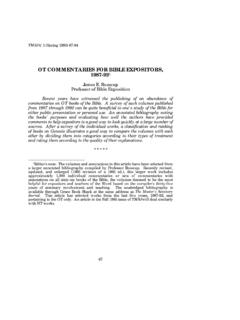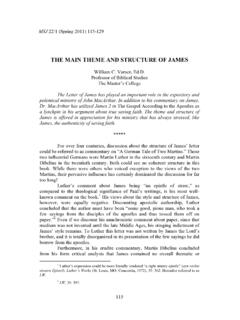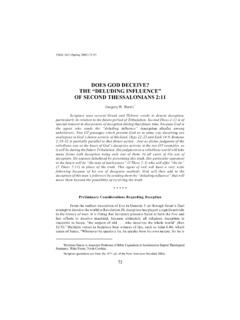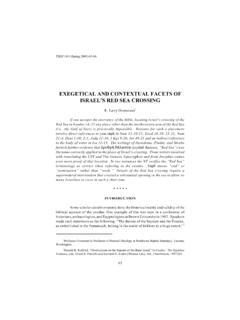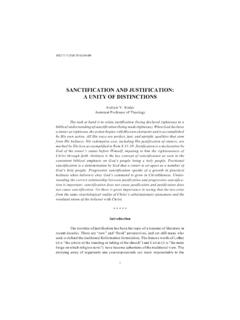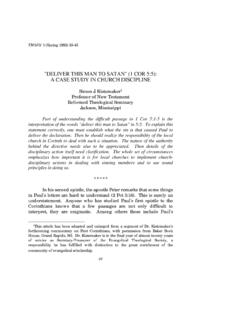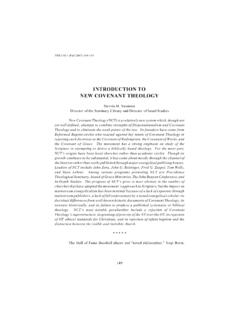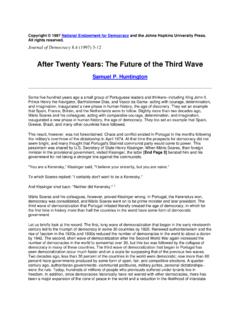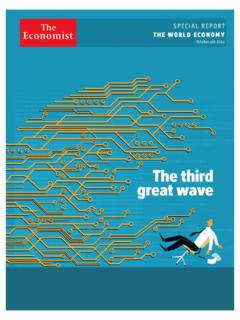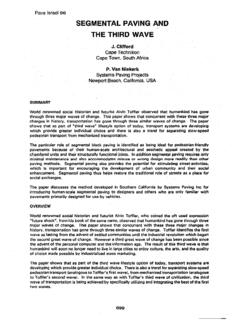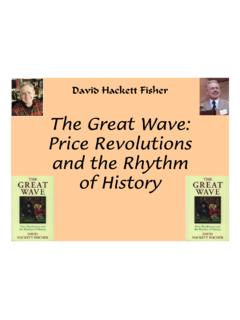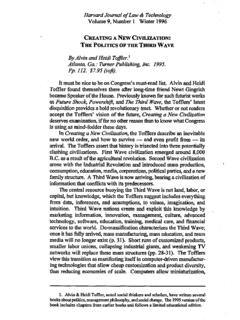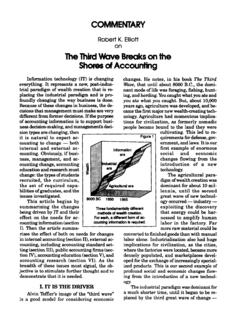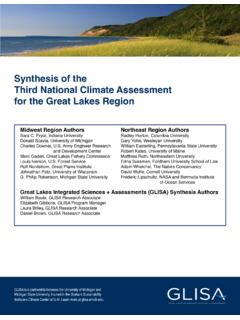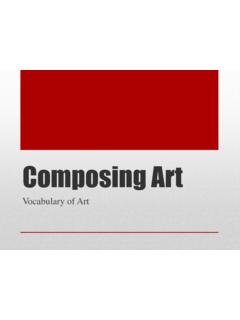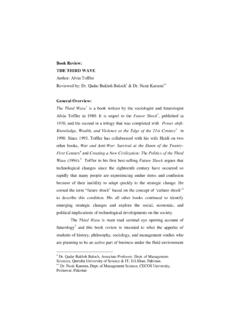Transcription of THE MONTANIST CRISIS: A KEY TO REFUTING THIRD-WAVE ...
1 235 TMSJ 14/2 (Fall 2003) 235-262 THE MONTANIST CRISIS: A KEY TO REFUTINGTHIRD-WAVE CONCEPTS OF NT PROPHECYF. David FarnellAssociate Professor of New TestamentThe Signs and Wonders Movement, also called the third wave , has madetremendous inroads into evangelicalism since the early 1980s. After initialarguments against it in the late 1980s and early 1990s, debate has mostly general opinion has been acceptance, indifference, or tolerance of themovement and its view of spiritual gifts, especially its form of prophecy. Theprime justification for the revival of what this group terms the prophetic gift hasbeen the work of Wayne Grudem.
2 Many articles, including those of the presentwriter, have examined the exegetical, theological, and doctrinal errors of hisposition. The present article uses a unique approach to REFUTING Grudem sviewpoint of non-authoritative congregational prophecy by examining the earliest charismatic crisis in the early church, the one caused by the Montanistmovement. The earliest ancient sources to refute Montanism reveal how the earlychurch immediately after the apostolic period understood the gift of prophecy. Anexamination of the ancient churches understanding of prophecy and refutation ofMontanism also supplies a striking condemnation of Grudem s viewpoint andstrongly reinforces the argument that he has imposed a novel as well as unorthodoxinterpretation of the NT gift of prophecy.
3 * * * * *INTRODUCTION TO THE CONTROVERSYT hroughout church history, the nature and practice of spiritual gifts haveacted as a proverbial lightening rod for controversy. In recent times, the early tomid-twentieth century witnessed the rise of Pentecostal, neo-Pentecostal, andcharismatic movements that brought the so-called gifts of tongues and prophecy 236 The Master s Seminary Journal1 The following discussion uses quotation marks and also the term so-called in reference to thesecurrent practices of tongues and prophecy, because a careful examination of the NT reveals dataabout the nature and practice of these NT gifts that contrasts with such practices as presently instance.
4 An exegetical examination of the biblical phenomenon of tongues in Acts 2:1-13 and 1 Corinthians 12 14 (especially 14:1-19) indicates conclusively that tongues were human languages thatthe speaker had not learned by natural means and not non-cognitive, non-understandable speech that iscurrently labeled as such. See Normal L. Geisler, Appendix 5. Were New Testament Tongues RealLanguages, in Signs and Wonders (Wheaton, Ill.: Tyndale, 1988) 165-68; Robert G. Gromacki, TheModern Tongues Movement (Grand Rapids: Baker, 1967) 53-68; Thomas R. Edgar, Tongues: TheNature of the Gift, in Miraculous Gifts, Are They for Today?
5 (Neptune, : Loizeaux, 1983) 108-70;Richard B. Gaffin, Jr., Prophecy and Tongues, in Perspectives on Pentecost (Phillipsburg, :Presbyterian and Reformed, 1979) 55-87; Robert L. Thomas, Understanding Spiritual Gifts, rev. ed.(Grand Rapids: Kregel, 1999 [1978]) the auspices of Fuller Theological Seminary, Wagner helped develop MC510 Signs,Wonders, and Church Growth, a course taught by John Wimber. Wagner said about the third wave , I see the third wave of the eighties as an opening of the straight-line evangelicals and other Christiansto the supernatural work of the Holy Spirit that the Pentecostals and charismatics have experienced, butwithout becoming either charismatic or Pentecostal.
6 I think we are in a new wave of something that nowhas lasted almost through our whole century. Wagner disassociated himself, however, fromcharismatics and Pentecostals, claiming, I myself have several minor theological differences withPentecostals and charismatics, which don t mar any kind of mutual ministry but keep me from sayingI m a charismatic (C. Peter Wagner, the third wave ? Pastoral Renewal (July-August 1983): 4- a succinct treatment of the similarities and/or differences between such groups, see also WayneGrudem, Preface, in Are Miraculous Gifts for Today?)
7 , ed. Wayne Grudem [Grand Rapids: Zondervan,1996] 10-12). into church This practice of so-called tongues and prophecy wasconfined generally to those groups favorable to their practice. Furthermore, inchurch history a sharp divide existed between those termed cessationist whobelieved miraculous gifts had ceased and noncessationists who argued for theircontinuance in some in the late twentieth and early twenty-first centuries, sharp boundariesbetween noncessationists and cessationists have been blurred or broken with the risethe Signs and Wonders Movement. C. Peter Wagner, a professor of church growthat Fuller Theological Seminary, coined the expression third Wave, when heclassified the rise of Pentecostalism as the first wave, the rise of the CharismaticMovement as the second wave, and the current Signs and Wonders Movement as thethird the third wave has so greatly influenced the practice of controversialgifts, especially prophecy, that a unique brand of prophecy has become acceptedpractice among many former cessationists.
8 Recent interest in the prophetic gift hascaused some to cross the traditional boundaries in an apparent attempt to find amediating position between the cessationist and noncessationists Grudem has probably been the most prominent advocate ofattempted mediation. Belonging to the cessationist Reformed tradition, Grudem hasbeen influenced by the third wave . His work on the NT gift of prophecy has madesignificant inroads into traditionally noncessationist groups. On the back cover ofThe MONTANIST Crisis 2373 See F. David Farnell, The New Testament Prophetic Gift: Its Nature and Duration, unpublishedPhD dissertation, Dallas Theological Seminary, Dallas, Texas, 1990; idem, When Will the Gift ofProphecy Cease?
9 , in Vital Contemporary Issues, vol. 2, ed. Roy B. Zuck (Grand Rapids: Kregel, 1994);idem, Is the Gift of Prophecy for Today? (4 parts), Bibliotheca Sacra: Part 1, The Current Debateabout New Testament Prophecy 149/595 (July-September 1992):277-303; Part 2, The Gift ofProphecy in the Old and New Testaments 149/596 (October-December 1992):387-410; Part 3, Doesthe New Testament Teach Two Prophetic Gifts? 150/597 (January-March 1993):62-88; Part 4, WhenWill the Gift of Prophecy Cease? 150/598 (April-June 1993):171-202; idem, Fallible New TestamentProphecy/ Prophets? A Critique of Wayne Grudem s Hypothesis, The Master s Seminary Journal 2/2(Fall 1991) work, several endorsements reflect that impact: former cessationist J.
10 I. Packercommented, Careful, thorough, wise, and to my mind, convincing; Vern Poythress,NT professor at Westminster Theological Seminary, wrote, .. a fresh, biblicallysound, readable contribution .. its depth of scholarship, pastoral solidity, andcautions against abuses are special strengths. Highly recommended ; L. Russ Bush,Professor of Philosophy of Religion at Southeastern Theological Seminary, related, If Grudem s convincing thesis could be heard, a new path of dialog could perhapsbe opened up in the Christian community. The research, clarity, and typical Grudemcandor continue to make this the finest book of the subject to date.

